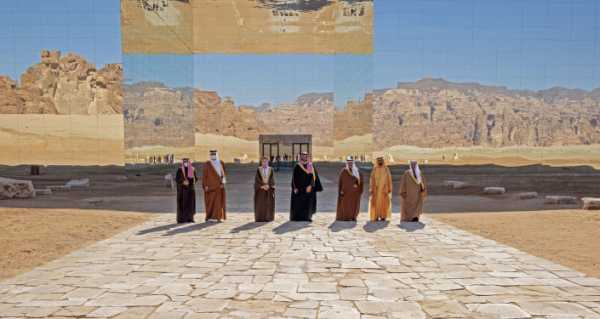
The Biden administration has begun reshuffling Washington’s foreign policy priorities in the Middle East, but the power dynamic in the region has dramatically changed over the past few years, with Gulf Arab states diversifying their strategic partnerships, seeking more equal relations with the US, according to Middle Eastern observers.
Riyadh has completely rejected the “negative, false, and unacceptable assessment” of the American intelligence report released by the US Office of the Director of National Intelligence (ODNI) on 26 February 2021. The document alleged that Crown Prince Mohammed bin Salman “approved” the assassination of Saudi journalist Jamal Khashoggi in October 2018, something the Saudi royal family has resolutely denied.
“The Kingdom rejects any measure that infringes upon its leadership, sovereignty, and the independence of the judicial system”, the Saudi Foreign Ministry said in an official statement, stressing that the monarchy had conducted a thorough investigation into the heinous crime, and tried and convicted the culprits.
Biden’s Two-Fold Goal in Pressuring Saudi Crown Prince
In the wake of the Khashoggi report’s publication, US Secretary of State Antony Blinken stated that the America would change its approach to the Saudi kingdom, specifying that Washington does not seek to “rupture the relationship”, but rather to “recalibrate” it.
On Friday, Washington announced sanctions and visa bans targeting 76 Saudi Arabian citizens as part of the country’s new human rights policy. Despite targeting the Saudi crown prince in its intelligence report, Washington did not impose any sanctions against Mohammed bin Salman.
The primary goal of Biden in pressuring Crown Prince Mohammed bin Salman is two-fold, according to Hamdi:
· first, “Biden wants to mark a permanent break from the Trump administration and present an image of his administration as a more responsible authority”;
· second, Washington wants “to make an example of Bin Salman to send a wider message to US allies that the new administration expects a return to ‘discipline’ in the region in the pursuit of US interests”.
In short, Biden is sending a signal to Turkey, Saudi Arabia, and the United Arab Emirates (UAE) that Washington is back to fill the power vacuum left in the region by Donald Trump and will seek specific foreign policy goals such as a nuclear deal with Iran, and a negotiated settlement in Yemen, according to the political analyst.

Saudi Crown Prince Mohammed Bin Salman announces a zero-carbon city called “The Line” to be built at NEOM in northwestern Saudi Arabia, January 10, 2021
‘A Whole New Dynamic in the Middle East’
The Biden administration is about to face a whole new dynamic in relations with Gulf Arab players who “want to be more independent of Washington these days”, says Dr Abdulkhaleq Abdulla, professor of Political Science at Emirates University and author of several books, including “The Gulf Moment”.
The Arab Gulf states are trying to diversify their strategic partnerships, going to Asia, to Europe, and to Russia, the professor highlights, adding this is a new pattern that completely differs from what the region used to be some 20, 30 years ago. “I’m not sure that Washington really understands the new realities in this part of the Arab world”, Abdulla remarks.
Thus, Riyadh is maintaining strong trade ties with China, who is the biggest importer of Saudi oil, and developing multi-level working relations with Russia regardless of the US calling the two countries its major geopolitical rivals. The Turkish newspaper Daily Sabah has recently alleged that the Biden administration’s change in tone towards Riyadh may push Saudi Arabia closer to Russia, “at a time in which the kingdom is less confident in the US as a security guarantor”.

Russian President Vladimir Putin and Saudi Arabia’s King Salman bin Abdulaziz Al Saud attend a meeting at the Saudi Royal palace in Riyadh, Saudi Arabia
Recalibrating is Common Goal for US and Saudi Arabia
While Washington has signalled its intent to “recalibrate” its relations with Saudi Arabia, Riyadh is also seeking clarity from the US about its foreign policy objectives in the region, notes Dr Hesham Alghannam, Saudi political scientist, Fulbright scholar, and a senior research fellow at the Gulf Research Centre, Cambridge.
The Saudi political scientist stresses that Riyadh would also “support a complete solution to the Iranian issue, not to divide it into small chunks”.
“The kingdom is not against positive engagement in any negotiations and talks, however we are against legitimising the actions of Iran across the region”, he points out.
The Biden administration is seeking to return to the 2015 Joint Comprehensive Plan of Action (JCPOA), commonly known as the Iran nuclear deal, triggering concerns among Washington’s Gulf and Israeli allies, who earlier hailed Donald Trump’s May 2018 decision to tear the accord apart.
On 25 February, i24NEWS, an Israeli international news channel, reported that the Jewish state is in talks to establish a four-nation defence alliance with Saudi Arabia, the UAE, and Bahrain, citing unnamed Israeli officials. According to the broadcaster, the alleged talks likely came in response to the “growing Iranian threat”. While Israel does not have official diplomatic relations with Riyadh, it earlier signed peace deals with the UAE and Bahrain within the framework of the Trump-brokered Abraham Accords.
Sourse: sputniknews.com






